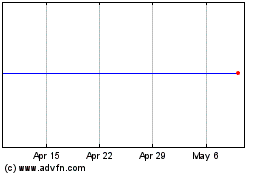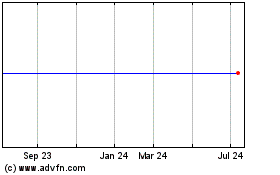By David Benoit and Heather Haddon
An activist investor has amassed a large stake in Whole Foods
Market Inc. and wants it to accelerate its turnaround and explore a
possible sale, increasing pressure on the upscale organic grocer to
find its footing now that its rapid growth has stalled.
Jana Partners LLC, which has built up an 8.8% stake in Whole
Foods along with several allies, wants the chain to improve its
technology and operations to better compete with larger rivals,
shake up its board and find out how much a potential bidder might
be willing to pay, according to a Monday regulatory filing.
A Whole Foods spokeswoman said that the company "is open to the
views and opinions of all of our shareholders."
"We are committed to driving value for all Whole Foods Market
shareholders and will continue to act to achieve this important
objective," she said.
Jana's campaign is the latest quandary for Whole Foods, which
has struggled to make the transition from highflying upstart with a
loyal following into a large, national chain with the kind of
back-office systems tracking customers and inventory that rivals
use to keep costs down and sales up.
Whole Foods' stock had risen 4% over the past 12 months before
The Wall Street Journal reported that Jana had taken a stake in the
company, compared with a 15% gain in the S&P 500. The stock,
which has lost more than half of its value since peaking in 2013,
jumped more than 10% Monday afternoon.
Sales, meanwhile, have fallen over the past 18 months.
Same-store sales -- a key retailer metric -- fell 2.5% during its
fiscal year that ended in September 2016.
Jana has lined up a potential slate of board nominees, according
to the filing, four months before the deadline to launch a board
fight. That is likely a signal that Jana, which has quietly reached
settlements with several companies this year to install new
directors, will be aggressive in demanding change at Whole
Foods.
The fund's board candidates include longtime industry analyst
Meredith Adler, Thomas "Tad" Dickson, the former CEO of Harris
Teeter Supermarkets, and Glenn Murphy, who led the turnaround of
Gap Inc. as the retailer's chief executive.
The fund is also working with well-known chef, food writer and
entrepreneur Mark Bittman and Diane Dietz, the former chief
marketing officer of Safeway Inc., which Jana helped shake up in
2013.
Mr. Bittman and Ms. Dietz, along with the three board
candidates, all purchased shares in Whole Foods as part of Jana's
campaign.
Jana hasn't yet met with Whole Foods' current board or
executives, according to people familiar with the matter, departing
from its usual approach of quietly working with management and
boards behind the scenes. The hedge fund, founded by Barry
Rosenstein in 2001, has played a role in changing the boards of
Bristol-Myers Squibb Co., Tiffany & Co. and Blackhawk Network
Holdings Inc., all without the kind of public fight associated with
activists.
Jana's campaign will amplify the quieter grumblings of other
Whole Foods shareholders. Some investors have said the company
should consider selling itself and have floated rival Kroger Co.
and Amazon.com Inc., which is building out a physical grocery-store
chain, as possible buyers.
After Monday's bump, Whole Foods' market value stands at around
$11 billion.
Mutual-fund giant Neuberger Berman, which owns about 2.4% of
Whole Foods, has been privately pushing for faster change at the
company, the Journal has reported. The firm has complained that the
chain hasn't fully capitalized on its popularity among millennials
or prepared foods sales, areas where it bests its rivals.
At Whole Foods' annual meeting in February, the board was
re-elected but faced a high protest vote. Two directors garnered
around 85% support, while an advisory vote on executive
compensation got 84%, levels that signal investor angst.
Some investors say that while the company is taking the right
steps, it is moving too slowly to catch up to rivals that are years
ahead in retail technology and customer management. They have
indicated that management had to perform this year or risk a louder
uprising this fall.
"We think [Whole Foods] needs to move from a growth phase to an
efficiency phase," UBS analysts wrote in tagging the company with a
sell rating last month. "The entrepreneurial culture that served it
well in its growth mode now needs to be more process-oriented. That
can be a rough transition."
The broader grocery industry is struggling with increased
competition and a slump in food prices that has eaten into profits.
But Whole Foods has struggled in particular as it has lost ground
in the natural and organic market that it once dominated.
As pressure has mounted, Whole Foods has cut costs and abandoned
an ambitious plan to nearly triple its number of stores. It has
tried various marketing gambits to retain customers. The company
began testing a loyalty program in 2014. Whole Foods intends to
expand it nationally from a pilot in the Dallas area.
Chief Executive John Mackey has said he expects these efforts to
reverse the company's fortunes. But Whole Foods revised down its
sales and profit forecasts for the year in February.
Write to David Benoit at david.benoit@wsj.com and Heather Haddon
at heather.haddon@wsj.com
(END) Dow Jones Newswires
April 10, 2017 18:32 ET (22:32 GMT)
Copyright (c) 2017 Dow Jones & Company, Inc.
Whole Foods Market, Inc. (NASDAQ:WFM)
Historical Stock Chart
From Mar 2024 to Apr 2024

Whole Foods Market, Inc. (NASDAQ:WFM)
Historical Stock Chart
From Apr 2023 to Apr 2024
